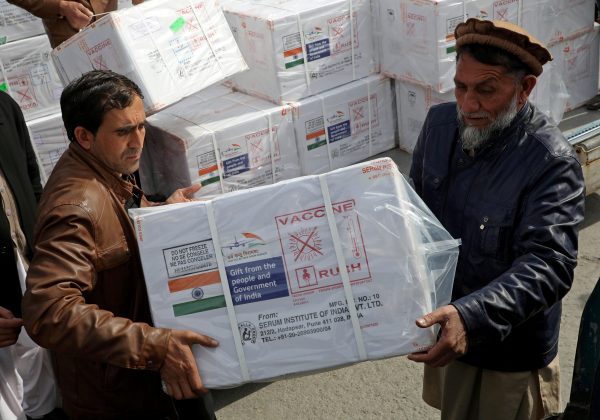Indian companies made critical interventions during the HIV/AIDS pandemic by supplying affordable antiretroviral medicines to African countries, where major pharmaceutical producers were demanding excessively high prices. After the Global Fund to Fight AIDS, Tuberculosis and Malaria took shape as a multi-stakeholder initiative to reduce the burden of these diseases, India’s generic pharmaceutical industry emerged as one of the largest suppliers.
India has emerged as a major supplier of COVID-19 vaccines. India has a partnership with the Serum Institute of India (SII), the world’s largest vaccine manufacturer by number of doses. In June 2020, SII entered into a licensing agreement with British-Swedish biopharmaceutical company, AstraZeneca, to supply one billion doses of the Oxford University COVID-19 vaccine to middle- and-low-income countries, including India. SII currently supplies its vaccine, Covishield, to the Indian government. Prior to this, another Indian biopharmaceutical company, Bharat Biotech International Limited, together with the Indian Council of Medical Research, began collaboratively developing a COVID-19 vaccine, ‘Covaxin’.
While organising a COVID-19 vaccine roll-out, the Indian government announced an elaborate ‘vaccine diplomacy’ strategy of providing vaccines to most of its neighbours and other developing countries. India’s neighbours, Bangladesh, Bhutan, the Maldives, Nepal, and Sri Lanka, will benefit from vaccine supplies as part of India’s development cooperation initiative. Afghanistan, the Seychelles, Myanmar and Mauritius are also expected to be beneficiaries. In South Asia, where China’s presence has grown in recent years, India’s ‘vaccine diplomacy’ could help to even out the playing field.
India has agreed to supply 10 million vaccine doses to Africa and one million to UN health workers under the COVID-19 Vaccines Global Access (COVAX) facility coordinated by the Global Alliance for Vaccines and Immunizations (GAVI).
Several other countries, including Mongolia, Oman, the Philippines, Bahrain, and the Dominican Republic could also be included in India’s ‘vaccine assistance’ program. India is using its soft power to assist developing countries, a role that it has increasingly been playing as a development partner.
The government has allowed for commercial vaccine exports to countries seeking them, while placing an embargo on the commercial sale of vaccines in India. Brazil and South Africa are benefiting from this, importing millions of doses of Covishield.
India’s vaccine sharing policy stands out given the alarming increase in ‘vaccine nationalism’. According to Duke University’s Global Health Institute, a group of advanced countries, accounting for only 16 per cent of the world’s population, have secured 60 per cent of the global vaccine supplies for themselves. Canada heads the list of ‘vaccine nationalists’, having secured vaccine supplies nearly ten times its population, while the United States has stocked enough doses to vaccinate every citizen well over six times. Other countries securing vaccine supplies well beyond their domestic requirements are Australia, Chile, the United Kingdom, and members of the European Union. But India is sharing its available vaccine supplies with several countries, while also ensuring that domestic demand is met.
Unsurprisingly, global vaccine supplies have been seriously affected, as every country tries to overcome the pandemic-induced crisis. Several studies caution that low vaccine availability, especially for smaller countries, will prolong recovery and trigger significant increases in global inequalities. A Rand Corporation study has concluded that if low and low-middle income countries (LLMICs) are unable to adequately immunise their populations, high income countries (HICs) will be severely impacted. The total cumulative economic cost for 30 HICs could increase from US$82 billion in 2020–2021 to US$258 billion in 2023–2024. The United States could incur the highest relative cost, of US$15.7 billion in 2020–2021, rising to US$49.3 billion in 2023–2024.
A recent study commissioned by the International Chamber of Commerce observes that the equitable distribution of vaccines is in the economic interest of every country, especially those that mostly depend on trade. If all HICs fully vaccinate their populations by mid-2021 and LLMICs are largely excluded, the global economy could lose upward of US$9 trillion, which is larger than the combined GDP of Japan and Germany.
In October 2020, India and South Africa took the initiative to ensure the accessibility and affordability of COVID-19 related vaccines, medicines, and products through a proposal in the World Trade Organization (WTO). The two countries, and nine other countries that have since supported them, argued in favour of granting waivers from commitments to implement or apply four forms of intellectual property rights, so that these critical products and technologies are widely available.
India’s initiatives to make vaccines widely available to developing countries, together with growing evidence of the benefits from making COVID-19 vaccines accessible, suggests that during a pandemic, medical products must be treated as global public goods.
Biswajit Dhar is Professor at the Centre for Economic Studies and Planning School of Social Sciences, Jawaharlal Nehru University.

